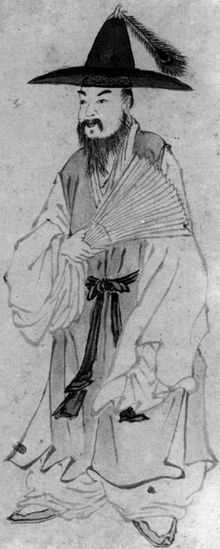Pak Je-ga
| Pak Je-ga | |
 Pak Je-ga (1790) | |
| Korean name | |
|---|---|
| Hangul | 박제가 |
| Hanja | 朴齊家 |
| Revised Romanization | Bak Je-ga |
| McCune–Reischauer | Pak Che-ga |
| Pen name | |
| Hangul | 초정 |
| Hanja | 楚亭 |
| Revised Romanization | Chojeong |
| McCune–Reischauer | Ch’ojŏng |
Pak Je-ga (Hangul: 박제가; hanja: 朴齊家; 1750–1815) was a scholar of school of Practical learning (Silhak) in the late Joseon Dynasty.[1] He was a student of Park Ji-won.
Background
Pak Je Ga was a famous Silhak scholar in the late Joseon Dynasty. He was a student of another famous Silhak scholar, Park Ji Won. Pak Je Ga born in 1750 and died in 1815. Pak Je Ga went to Qing (also referred to as "Ching"), which was the name of China at that time, after becoming a student of Park Ji Won. He learned about China’s modern culture, advanced techniques, and its economic system while there. After returning from Qing, Park Ji Won worked in Jiphyeonjeon, a place where important scholars and scientists worked, during the time of King Jeongjo.
Importance
Because the Joseon government supported ‘Yuhak', a neo-Confucianist conservative ideology, Pak Je Ga had an important role and his desire was to make Joseon rich in science and commerce.
He authored several books; the compilation is titled, Jeongyungyp. He wrote about making the commerce system stronger in Umyoungnomchogo and Gunyeonjib. At that time, it was quite shocking to believe in Silhak, whose ideas opposed Yuhak.
Pak Je Ga developed the way of agriculture, and he also enhanced some of the farming machinery to cultivate plants.
Books
- Bukhakui (북학의 北學議)
- Chungyujip (정유집 貞否集)
- Myungnongchogo (명농초고 明農草稿)
- Hangaekgunyeonjip (한객건연집 韓客巾衍集)
- Shigo (시고 詩稿)
- Muyedobotongji
References
- ↑ Pyŏng-man An (2003). Elites and political power in South Korea. Edward Elgar Publishing. p. 43. ISBN 978-1-84064-971-0.
Site Link
- 우린 아직 박제가를 모른다 조선일보 2010.02.23
- 중상학파 (重商學派)
- 1997년 08월의 문화인물:초정 박제가(楚亭 朴齊家)
Relation
- Kim Haboush, JaHyun and Martina Deuchler (1999). Culture and the State in Late Chosŏn Korea. Cambridge: Harvard University Press. 10-ISBN 067417982X/13-ISBN 9780674179820; OCLC 40926015
- Lee, Peter H. (1993). Sourcebook of Korean Civilization, Vol. 1. New York: Columbia University Press. 10-ISBN 0231079125/13-ISBN 9780231079129; 10-ISBN 0231079141/13-ISBN 9780231079143; 10-ISBN 0231104448/13-ISBN 9780231104449; OCLC 26353271
- Noh, Daehwan. "The Eclectic Development of Neo-Confucianism and Statecraft from the 18th to the 19th Century," Korea Journal. Winter 2003.